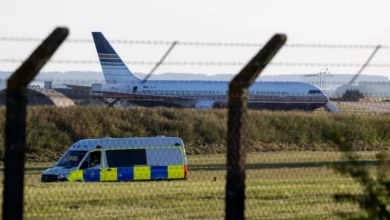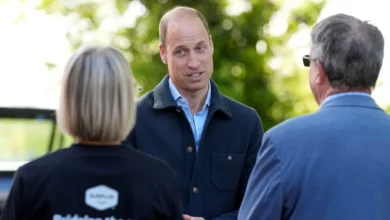British Prime Minister David Cameron on Monday became the first foreign leader to visit Egypt since the downfall of Hosni Mubarak which electrified the Middle East and forced the West to rethink its policies in the region.
Cameron's arrival came hot on the heels of a visit by William J. Burns, US Undersecretary of State for Political Affairs, who started a visit to Egypt in which he will meet with the army-led interim government as well as political groups.
Cameron will speak to anti-Mubarak opposition figures but not the Islamist Muslim Brotherhood.
"I think this is a great opportunity to talk to those currently running Egypt to make sure this really is a genuine transition from military rule to civilian rule," the prime minister said before arriving in Cairo.
An British official travelling with Cameron said he would meet members of the former opposition to Mubarak but not the Brotherhood, which is Egypt's most organized political grouping and regarded with suspicion in the West.
EU foreign policy chief Catherine Ashton is due to arrive in Egypt on Tuesday to discuss the post-Mubarak era in which the army is running the country while setting up free elections to deliver civilian rule and democracy.
Uprisings in Egypt and Tunisia have spread like wildfire in the Arab world, threatening entrenched dynasties from Libya to Bahrain. The West has watched with alarm as long-time allies and foes came under threat, urging reform and restraint.
The Muslim Brotherhood, once banned and playing a growing role in the new Egypt, rejected a government reshuffle on Monday, calling for a purge of the old guard cabinet appointed by Mubarak.
"I think this is a great opportunity to talk to those currently running Egypt to make sure this really is a genuine transition from military rule to civilian rule," the British prime minister said before arriving in Cairo.
A British official travelling with Cameron said he would meet members of the former opposition to Mubarak but not the Brotherhood, which is Egypt's most organized political grouping and regarded with suspicion in the West.
In a bid to placate pro-democracy activists, the reshuffle late on Sunday named several Mubarak opponents but disappointed those eager for a new line-up as key defense, foreign, justice, interior and finance portfolios were left unchanged.
Egypt's new military rulers, who took over after an 18-day uprising ended 30 years of Mubarak's iron rule, have said change in the constitution for elections in six months should be ready soon and hated emergency laws would be lifted before the polls.
But for many democracy advocates, who want a completely new cabinet with no links to Mubarak's corrupt and autocratic elite to govern the Arab world's most populous nation, the military needs to put fresh faces in office.
"No one offered us any post and had they done so, we would have refused because we request what the public demands that this government quit as it is part of the former regime," said Essam El-Erian, a senior member of the Brotherhood.
"We want a new technocratic government that has no connection with the old era," he told Reuters.
The Brotherhood, which says it wants a democracy with Islamic principles, is represented on a constitutional change committee, a council to protect the revolution and will register as soon as new rules allow.
Uncertainty remains over how much influence Egypt's military will seek to exert in reshaping a ruling system which it has propped up for six decades, with diplomats saying it is vital to "create an open political space". Wary of a clampdown, the Brotherhood took a cautious line early in the protests but has slowly assumed a more prominent role. It still treads warily, saying it will not field a presidential candidate or seek a majority in parliament.
Any sign the army is reneging on its promises of democracy and civilian rule in this key US ally which has a peace treaty with Israel could reignite mass protests on the street.
Friday's celebrations which marked a week since Mubarak's overthrow served as a reminder to the military of people power.
The military on Monday announced an amnesty for weapons stolen during the revolution and there were pockets of protests in and around Cairo over pay and conditions despite an order aimed at ending strikes and protests damaging the economy.
In moves to appease democracy advocates, authorities said on Sunday they released 108 political prisoners and Prime Minister Ahmed Shafiq on Monday ordered that streets be renamed to honor some of the 356 "martyrs" who died in the revolt.
But it is increasingly clear that demands for a complete cabinet overhaul top many political activists' agendas along with lifting emergency rule and freeing political prisoners.
Mubarak, 82, shuffled his cabinet shortly after protests over corruption, poverty and repression erupted on Jan. 25 in an attempt to assuage rage over his autocratic rule and to try and distance himself from his own regime.
Field Marshal Mohamed Hussein Tantawi, who leads the ruling military council that is running Egypt, has been defense minister for 20 years and, according to diplomats, had the job thrust upon him and wants to get back to running the military.




